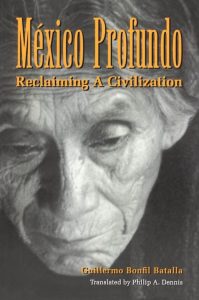México Profundo, Reclaiming A Civilization
México Profundo, Reclaiming A Civilization, by Guillermo Bonfil Batalla (1935-1991), is translated by Philip A. Dennis and was published by the University of Texas Press in 1996, with eight paperback printings through 2009. From the back cover, Mexican studies; anthropology: “For Guillermo Bonfil Batalla, the remaining Indian communities, the ‘de-Indianized’ rural mestizo communities, and vast sectors of the poor urban population constitute the México profundo. Their lives and ways of understanding the world continue to be rooted in Mesoamerican civilization… Since the Conquest [Hernan Cortés, 1519-1521] Bonfil argues, the peoples of the México profundo have been dominated by an ‘imaginary México’ imposed by the West.”
Philip A. Dennis is a Professor of Anthropology at Texas Tech University. The book opens with his Foreword of 1995: “Guillermo Bonfil Batalla’s book México profundo: una civilización negada seems prophetic in retrospect. He predicted the collapse of what he called the imaginary Mexico and hoped that the strengths of the “México profundo” would serve as a basis for building a new Mexico. According to Bonfil Batalla, Mexico is not a mestizo country. Rather, it is a country whose majority population continues to be rooted in Mesoamerican civilization and whose way of life reflects cultural patterns and values with thousands of years of history … The México profundo erupted into national consciousness on January 1, 1994, when the Zapatista National Liberation Army (Ejército Zapatista de la Liberación Nacional – EZLN) took over four towns in the southeastern state of Chiapas. Their struggle provoked a still-unresolved confrontation with the Mexican government. Most of the EZLN fighters are Maya Indians from a poor state whose population includes more than a million Maya people. Their rebellion responds to years of injustice and oppression. In recent years in Chiapas, large cattle ranchers have continued to usurp Indian land, with the support of paid gunmen and the judicial police. Land and wealth and political power in Chiapas are highly concentrated in the hands of the local elite, while the Indian and peasant majority live in extreme poverty.”
“Guillermo Bonfil Batalla had a distinguished career in Mexican anthropology, cut tragically short by his death in an automobile accident in July 1991 … Bonfil Batalla began his career as one of the early critics of indigenismo, a continent-wide movement concerned with Indian welfare, but directed by non-Indians. He and other Mexican anthropologists of the early 1970s concluded that the paternalistic stance of indigenismo obscured the truly multicultural nature of Mexico, and they supported, instead, Indian efforts at self-determination.”
The book is divided into three parts (each with two to five subheadings): Part I, A Civilization Denied; Part II, How We Came to Be Where We Are; and Part III, The National Program and the Civilizational Project. From Bonfil Batalla’s summary that precedes Part I: “What unifies them [the México profundo] and distinguishes them from the rest of Mexican society is that they are bearers of ways of understanding the world and of organizing human life that have their origins in Mesoamerican civilization and that have been forged here in Mexico through a long and historical process … The civilization of Mesoamerica has been denied but it is essential to recognize its continuing presence.” Later in Part I, under the subheading Cultural Schism, he writes: “Cultural diversity is not a problem in itself … The problem lies in the dual, asymmetrical structure that underlies the plurality. At this point it is indispensable to return to the origin of this problem, which is none other than the colonial situation from which current Mexican society is derived. This is a past whose basic, antagonistic duality has not yet been superseded. To the contrary, it is expressed in every facet of national life. It is an original sin that has not yet been redeemed.” More »
